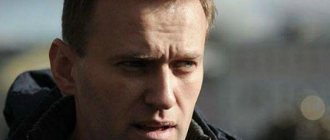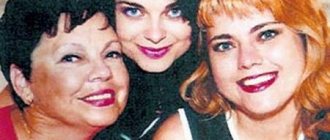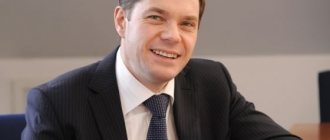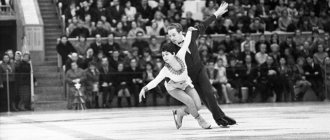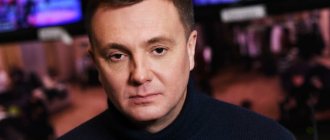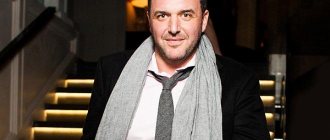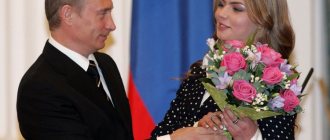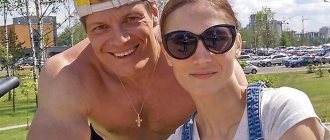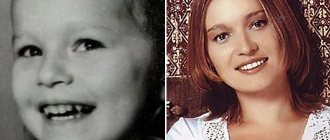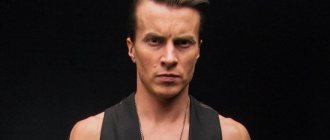- September 30, 2019
- State
- Victoria Samarskaya
The biography, parents, family of Alexei Navalny is one of the most sought-after information on the Internet. Of course, after all, we are talking about a person who leads the opposition to the current government of Russia, and in 2012, according to Time, was one of the hundred most influential people in the world. In 2017, he was recognized as politician of the year (Vedomosti) and included in the top 25 most authoritative people on the Internet.
Biography of Navalny: nationality, parents
The future politician was born in 1976, on June 4. His homeland is Odintsovo district, the small village of Butyn. Anatoly Navalny, the father of an oppositionist who was an SA officer, was once transferred here. A native of the Chernobyl district of the Kyiv region, he married a girl from the Moscow region named Lyudmila. Together with her they went to their place of duty.
Lyudmila worked as an economist and worked at a wicker weaving factory. When the company went bankrupt, the parents decided to rent a building next door and opened a similar production. The Kobyakovskaya factory is a Navalny family enterprise, and each family member has 25% of the shares: parents and their sons. Alexey has a younger brother named Oleg. According to Wikipedia, Navalny is not currently a co-owner of the factory.
You can find information on the Internet that Navalny is a Jew. The biography written by the politician himself denies this fact. Alexey Anatolyevich’s father is Ukrainian, his mother is Russian. Navalny himself largely considers himself Ukrainian. A significant part of his relatives live in this country. Before the tragic events in Chernobyl in 1986, the family regularly went on vacation to their father’s homeland.
Education
Navalny graduated from secondary school in the village of Kalininets, after which he tried to enroll in law school at Moscow State University, but did not get one point. In 1993, he became a student at RUDN University, graduating as a lawyer. Subsequently, he passed the bar exam. It is curious that journalists tried to find Navalny’s classmates and fellow students, but they managed to find only one student from the Alabino school named Obukhov. For him, Alexei Navalny, whose biography is discussed in the article, was extremely unsociable and unsociable. He doesn't even have any photos left of them together.
Having entered the RUDN University, Navalny moved to the capital and never returned to the Moscow region. Journalists were unable to find any of his fellow students, but Denis Alekseev, who entered the university a little earlier, shared that after the first year, Navalny was almost invisible, perhaps he transferred to the correspondence department. Rumors even appeared on the Internet that Navalny failed to graduate from university. Having somehow received a diploma, he decided to consolidate his higher education by entering the Financial Academy, which was created under the government of the Russian Federation.
On Wikipedia, Navalny’s biography is presented in the official version. It says that Alexey Anatolyevich has two higher education diplomas - a lawyer and an economist. Moreover, in 2010, with the support of G. Kasparov, E. Albats and S. Guriev, the future politician studied at Yale University (USA) for six months. We are talking about a special Yale World Fellows program.
There are well-known statements by Lagodinsky, a member of the German Green Party, who was among the 15 lucky students who studied at Yale. Lectures on politics, philosophy, and economics gave program participants the opportunity to become part of the American elite. S. Lagodinsky believes that this is a huge contribution to the education of Navalny, whose biography could change if he wanted to make his career in the USA. He showed himself to be an interesting person who shared the ideas of conservative liberalism.
Childhood. Education
Alexei Navalny was born in the military town of Butyn near Moscow. His father, Anatoly Navalny, a native of the Chernobyl region, graduated from the Kiev Military School, after which he was assigned to Moscow. Mom, Lyudmila Ivanovna, grew up in a village near Zelenograd, graduated from the State University of Education, worked as a laboratory assistant at a research institute that produced microelectronics, and later worked at a woodworking factory.
Alexey Navalny in childhood and now
In 1993, Navalny’s parents opened a wicker weaving workshop in the Odintsovo district of the Moscow region on the basis of a bankrupt factory, where Lyudmila Navalnaya had previously worked.
In 1994, the young man graduated from the Alabino school in the village of Kalininets near Moscow and entered the law faculty of the Peoples' Friendship University of Russia, missing one point for admission to Moscow State University. In 1999, he became a student at the Financial Academy under the Russian Government, studied at the Faculty of Finance and Credit, and in 2001 received a diploma in the specialty “Securities and Exchange Business.”
Alexei Navalny with his mother, aunt and brother
Much later, in 2010, he became a fellow of Yale University's Yale World Fellows program. Every year, the university selects about 15 gifted people, mostly from third world countries, and invites them to Yale for six months to study the global problems of our society.
Entrepreneurial activity
Nationality is given a significant place in Navalny’s biography, because even from his student years he began to show entrepreneurial talent. Later he regretted that he was engaged in business at a time when he should have been studying. Be that as it may, back in 1997 he became the owner, the scope of which included hairdressing services. Having a zero balance, the company was sold. It seems that Navalny was interested in the process itself - the opening of companies and their resale. In the same year, he registered Allekt LLC.
He mastered the skills of a lawyer in serious firms, working for a short time at St-Group and Aeroflot Bank. In these companies, he first encountered corruption and serious violations of the law. It was during these years that the Navalnys created a family business - the Kobyakovsky wicker weaving factory, and a group of lawyers - (2000). In the latter, Alexey Anatolyevich, who owns 35% of the shares, was the chief accountant. The company's field of activity is securities trading. Turning out to be extremely gambling, Navalny actively played on the stock exchange, losing all his assets, which led to the ruin of N. N. Securities".
But he did not despair, becoming a co-founder of Euro-Asian Transport Systems (2001). In essence, the company with a catchy name was engaged in logistics, but this brought Navalny, whose biography the article is devoted to, some income. And he allowed him to do something that brought him satisfaction - politics.
Navalny's new projects
One of the new projects that Alexey and his team launched in 2020 is Pensiya.org . On this website, every Russian who disagrees with raising the retirement age can leave a request. Then, on his behalf, the service will send an appeal to one of the deputies who supported the initiative. In addition, before the elections, the voter will receive a message with a list of deputies who approved raising the retirement age.
Another recent project, “Smart Voting,” invites voters opposed to the United Russia party to cast their vote for another opposition candidate. After all, according to Navalny, the ruling party often wins with a rather low percentage of votes - 30-35%, and the rest is distributed among opposition nominees.
On December 4, 2020, the project website was blocked by Roskomnadzor for processing users’ personal data without their consent. Nevertheless, Navalny’s “Smart Voting” performed well in the last elections to the Moscow City Duma. Thanks to him, several independent and honest candidates managed to win mandates.
During the elections in St. Petersburg in 2019 , Alexey nominated himself for the post of municipal deputy. His main goal was to make it more difficult for Alexander Beglov to obtain a deputy seat and to create conditions for the second round of elections. To achieve the goal, Alexey was ready to unite with other parties, even despite ideological differences.
In the same year, the project “Navalny’s Trade Union” , on the website of which anyone can get acquainted with the average salary of a public sector employee in the region. If the actual salary differs from the declared one, you can leave an anonymous request to file a complaint on the website. This project was unexpectedly supported by the press secretary of the President of the Russian Federation , who stated that any assistance in monitoring the implementation of the “May decrees” is important.
Yabloko Party
It was with this political organization that public figure Alexei Navalny began. The biography of this period is described by his associates, including S. Mitrokhin, I. Yashin. Navalny joined the party in 2000, when Putin was at the helm. He made the choice consciously, although he did not particularly share the program positions of the right. He understood that the president was committed to raising the threshold for opposition parties to enter the State Duma, so he decided to support one of them.
Having arrived at the announcement, Navalny remained in the status of a candidate for a whole year, but immediately began to show activity, joining S. Mitrokhin’s group. Participated in regional elections, being responsible for legal support. I received from 2 to 3 thousand rubles plus travel cards if I had to travel to a place. He was attracted not by money, but by the idea and political experience. Having become a member of the party, he participated in organizing protests for $300, and a year later he joined the political council of the Moscow branch of Yabloko. From 2004 to 2007 was its leader.
In December 2007, the career of Alexei Anatolyevich Navalny ended at Yabloko. The biography, compiled from official sources, states: he was expelled after demanding a 70% renewal of the composition of the party bureau and the re-election of its leader, G. Yavlinsky. The decision stated that Navalny caused damage to the party with his nationalist views.
Personal life
Against the backdrop of a scandalous political career, Alexei Navalny’s personal life does not look so remarkable.
Alexei Navalny's wife
In 1999, Navalny met his future wife at a resort in Turkey. For more than 15 years , Julia has endured all the consequences of her husband’s political activity, but supports him in his aspirations. Friends and colleagues claim that the family is strong and happy. The spouses claim that all this is due to the delimitation of spheres of influence. Despite the fact that Yulia supports her husband’s political views, she does not give advice on work, just as Alexey does not interfere in raising children and running the household.
Children of Alexei Navalny
The couple are raising two children - Zakhara and Daria , and live in a panel house in the Moscow region in the Maryino district. The area of an economy class apartment is about 80 square meters. As of 2020, the politician owned a Hyundai car and a VAZ-21083, his wife drives a Ford. According to official data, Navalny's annual income for 2012 amounted to 9 million rubles . This information was made public during the election race for the right to become mayor of Moscow. At the end of 2016, the controversial politician announced that he intended to find rental housing that would be more suitable for a family with two grown children, who at that time lived in one room.
"People"
Back in 2005, when there was a romantic friendship between the SPS and Yabloko, Navalny met a number of leaders of the right-wing movement - Nikita Belykh, Natalya Morar and Maria Gaidar. With the latter, he created the “Democratic Alternative,” known by its short name “Yes!” Navalny, whose biography is extremely interesting to understand how he became the head of the opposition, led political debates. In 2007, he even became the editor-in-chief of the “Fight Club” program at TVC. The project won several grants, but was then canceled due to the provocations that began.
In the same year, three leaders (Navalny, Prilepin and Gulyaev) founded the national democratic movement. It was called “People” and suggested unification with “Other Russia”, but this did not happen. It is important to understand here that for Navalny “nation” and “nationality” are different concepts. He focuses not on the ethnic, but on the social component.
In 2008, “People” joined the “Russian National Movement” to participate in the election campaign and receive mandates to the State Duma. However, in 2011, the organization ceased to exist, having played a significant role in the biography of Alexei Navalny. “Nationality” as a term is one of the reasons why the RND was not organizationally supported, but the leader of the opposition still considers this platform to be correct.
Social and political activities
In 2000, Alexei Navalny joined the Yabloko democratic party and was a member of the party’s Federal Political Council. Two years later, he was elected to the regional council of the capital branch of Yabloko. From 2004 to 2007, Navalny headed the apparatus of the Moscow regional branch of the party.
Alexei Navalny was a member of the Yabloko party
In 2007, Navalny was expelled from Yabloko. The reason given was “causing political damage to the party, in particular, through nationalist activities.” As Navalny himself stated, the real reason for his expulsion is the demand for the resignation of Yabloko leader Grigory Yavlinsky.
In 2004, Navalny founded the “Committee for the Protection of Muscovites,” a citywide movement that opposes corruption in urban planning and the violation of citizens’ rights. A year later, Alexey, together with like-minded people, became the founders of a new youth movement called “YES!” He also began to coordinate the “Police with the People” project.
Rally of the “Committee for the Defense of Muscovites”
Since 2006, Navalny has coordinated the “Political Debates” project and acted as chief editor of the “Fight Club” program on TVC.
In 2007, he co-founded the national democratic movement “People” along with the writer Zakhar Prilepin and Sergei Gulyaev. It was planned that “People” would subsequently join the “Other Russia” coalition, but this did not happen.
Political debate between Navalny and Lebedev In 2008, Navalny founded the organization “Union of Minority Shareholders”, which defended the rights of private investors.
Navalny took part in the nationalist “Russian March” marches. In 2008, he witnessed the brutal detention of the leader of the “Slavic Union” Dmitry Demushkin by riot police, and was ready to defend him in court.
Alexey Navalny adheres to nationalist views
In 2008, information appeared about the creation of the “Russian National Movement”, which included the organizations “Great Russia”, “People”, and DPNI. Navalny stated that the movement plans to participate in the State Duma elections. But in 2011 the movement ceased activity. Navalny’s video in support of the “People” movement In 2009, Navalny became a freelance adviser to the governor of the Kirov region, Nikita Belykh, who, as the editors of uznayvse.ru want to note, was arrested in the summer of 2020 on charges of taking a bribe.
Protests 2011-2013
The politician’s ambitions grew as the opposition movement strengthened, which reached its peak in 2011-2013. Navalny, whose biography has been described in some detail during this period, recently launched a meme on the Internet, calling United Russia “a party of swindlers and thieves.” He invited party representatives to take part in a discussion on a radio program, but was refused through the press service. During the State Duma elections (2011), he called on voters to vote for any party, but against United Russia.
After the elections, he participated in authorized and unsanctioned actions against their results, accusing the authorities of falsifying the will of the people. During a march with hundreds of supporters to the Central Election Commission building, he and I. Yashin (Solidarity United Democratic Movement) were detained and then arrested for 15 days. The decision of Judge E. Borovkova will be appealed by the European Court of Human Rights in 2014. The Russian Federation was demanded to pay Navalny and Yashin 26 thousand euros each.
By the way, the arrest did not prevent the oppositionist from participating in all significant events in 2011-2013, including a large rally on May 6, 2013 on Bolotnaya Square. This year, Navalny, whose brief biography does not give a complete idea of the scale of his personality, for the first time announced his desire to run for president. He promised Russians a decent life in a country so rich in natural resources that it could provide the same high standard of living as any European country.
Yale University and the mayoral election
But one day Alexey became seriously interested in the Yale World Fellows program. Every year, about 15 people from different countries are chosen around the world. Based on the recommendations of Garry Kasparov, Evgenia Albats, Sergei Guriev and Oleg Tsyvinsky, Navalny was offered to the university. And in 2010, Alexey successfully completed the 6-month course. Many Russian politicians did not approve of this move. According to the leader of the Communist Party of the Russian Federation G. A. Zyuganov:
Mr. Navalny is a political product manufactured in US laboratories for the next pogrom of Russia.
In 2013, Navalny ran for mayor of the capital, but lost to Sergei Sobyanin.
Criminal prosecutions
Several criminal cases are being initiated against Navalny one after another. Thus, in December 2012, the Investigative Committee charged both brothers with fraud in the amount of 55 million rubles related to Glavpodpiska LLC. The company was founded by Alexey Anatolyevich in 2007.
At the same time, an investigation was conducted into the Kirovles case. Under pressure from A. Bastrykin, it was resumed in the summer of 2012; until that moment, investigators did not see any crime in Navalny’s actions. According to the authorities, the politician took advantage of his freelance position as an adviser to the governor N. Belykh to enter into a conspiracy with P. Ofitserov and the general director of Kirovles Opalev.
The first one registered the “Vyatka Forestry Company” in his name, which was supposed to sell timber, but in fact was engaged in waste of property, because the products were sold to the intermediary at clearly reduced prices. The amount of damage amounted to 16.2 million rubles. The whole case is based on Opalev’s testimony, but is not supported by any documents.
In 2013, Navalny, whose biography is discussed in the article, was convicted. Alexey Anatolyevich received five years probation, and P. Ofitserov - 4 years. In 2016, the European Court of Human Rights appealed the verdict, and the Supreme Court of the Russian Federation was forced to overturn it. However, in 2017, a retrial of the case took place in Kirov, confirming the original verdict. In addition, Navalny is obliged to pay Kirovles 2.1 million rubles in compensation for damage caused.
In December 2014, the brothers were convicted in a fraud case in. Navalny was again given a suspended sentence of 3.5 years. In 2020, the period was extended by another 12 months. However, in 2020, the politician made an official statement that the ECHR declared the charges illegal, as a result of which the authorities paid him compensation exceeding 4 million rubles.
Navalny is regularly arrested for participating in protests, serving time in a special detention center. However, this does not stop him from continuing his opposition activities.
Prosecutions. The Kirovles case
On December 5, 2011, that is, the day after the State Duma elections, Alexey Navalny spoke at an authorized rally on Chistoprudny Boulevard. Muscovites who came to the rally expressed disagreement with the election results and made accusations of fraud against the election commission and the United Russia party.
Alexey Navalny at a rally on Chistoprudny Boulevard
After this action, Navalny and like-minded people went to an unauthorized march to the Russian Central Election Commission, where he was detained by the police. The next day, Navalny was found guilty of resisting law enforcement officers and sentenced to 15 days of administrative arrest. Navalny was released on December 21.
On May 9, 2012, Navalny was again sentenced to arrest for 15 days. This time – for participation in an illegal public event on Kudrinskaya Square, the so-called People’s festivities,” which became a mass sign of protest against the dispersal of the “March of Millions” that took place earlier, on May 6. The march participants were unhappy with the fact of Vladimir Putin's inauguration. Navalny appealed this detention and arrest to the European Court of Human Rights.
Photo from the “March of Millions” (05/6/2012)
In May 2011, a criminal case was opened against Alexei Navalny under Art. 165 of the Criminal Code of the Russian Federation – “causing property damage by deception or abuse of trust.” The point was that Navalny and businessman Pyotr Ofitserov, the owner of the Vyatka Forestry Company, allegedly misled the director of the State Unitary Enterprise Kirovles, Vyacheslav Opalev, as a result of which he signed a contract unfavorable for his enterprise and suffered damage of 16 million rubles.
Navalny denied guilt, citing bias in the case, since shortly before this he had presented information on cuttings at Transneft on his blog, and also accused Opalev of “creating completely unthinkable schemes” for the sale of timber. According to Navalny, he achieved the dismissal of Opalev and a full audit of Kirovles, which was the reason for initiating the case.
Navalny: “The Truth about Russia, Power and Putin”, 2011 After the proceedings, the case was dismissed on April 10, 2012. The reason is the lack of evidence of a crime. It was later resumed by order of the leaders of the Investigative Committee. However, on May 29 of the same year, the order to terminate the case was canceled.
The case came back to court in April 2013. The testimony of prosecution witnesses indicated that the cooperation of Kirovles with VLK was unprofitable for the former. However, VLK’s partners testified that the timber was shipped to them at market prices, and they have no complaints against both defendants in the case. The governor of the Kirov region, Belykh, who spoke at the trial, also stated that the activities of VLK did not harm the region.
On July 18, 2013, Navalny was sentenced to five years in prison and a fine (500 thousand rubles), Ofitserov was sentenced to four years in prison and a similar fine. The sentence was carried out during Navalny's election campaign for the mayoral elections.
Navalny was found guilty in the Kirovles case
During the appeal hearing that took place the next day, Navalny and Ofitserov were released on their own recognizance. During further consideration, violations were discovered when making a guilty decision, and the real terms were replaced with suspended sentences while maintaining the fine. Alexey Navalny appealed to the ECHR, which in February 2020 confirmed the violation of the rights of the accused in the Kirovles case, but did not recognize the case as politically motivated, as Navalny and Ofitserov’s lawyers insisted. The Kirovles case: Navalny’s last word At the end of 2020, the court again began considering the Kirovles case. The new sentence, according to Navalny, repeated the previous one verbatim. The defendants were again sentenced to 4 and 5 years probation. On the same day, the ECHR condemned the verdict, calling the goal of the entire process to exclude Navalny from the country’s political process.
2013 mayoral election
During the 2013 early elections for the mayor of the capital, United Russia nominated S. Sobyanin. For the first time, Alexei Anatolyevich Navalny is attempting to compete with the authorities (the biography of this period is well known to voters). His campaign headquarters was headed by Leonid Volkov, a Ural politician. Navalny’s candidacy was nominated by the RPR-PARNAS party and was successfully registered, although there was a joke everywhere that Sobyanin was guaranteed 50%, and his opponent - 5 years.
Navalny's election platform included several provisions that were attractive to Muscovites. Among them: expansion of the powers of local self-government, referendums on new developments that cause controversy among the population, implementation of the constitutional right of citizens to participate in peaceful demonstrations and rallies. But most importantly, he spoke about a mechanism that would make it possible to remove an objectionable mayor before the expiration of his term of office.
During the election campaign, information appeared that Navalny is a co-owner of a construction company in Montenegro, registered back in 2007. However, no accounts or securities were found abroad, which preserved Navalny’s right to participate in the election race.
According to the voting results, the protege of United Russia won, gaining 51.37%. Navalny managed to attract 27.74% of voters to his side. He received the greatest support in the central regions, the least in the periphery. However, the politician did not agree with the election commission’s data and the very next day he protested the results in court, which did not satisfy his claim.
Arrest and criminal cases
The criminal prosecution of Alexei Navalny started in 2011, when he was convicted of crime, namely causing property damage by deception. Based on the results of the investigation, the well-known non-system oppositionist was sentenced to 5 years in prison in 2013, but the day after the verdict, Alexey Anatolyevich was released on his own recognizance. Then both Russians and international society condemned Navalny’s sentence, considering it politically motivated. Even Russian President Vladimir Putin expressed his views on the verdict, calling it “strange.” After reviewing the case, the court changed the punishment and changed it to a suspended sentence.
Navalny brothers in the courtroom
Navalny's second high-profile criminal case was the trial in which he, along with his brother Oleg, was accused of large-scale theft and money laundering of a French company. As a result, the court sentenced Alexey Anatolyevich to 3.5 years probation, and his brother received a real sentence of the same amount. The brothers-accomplices were also fined 4.8 million rubles.
The Kirovles case is another high-profile criminal proceeding against Navalny. The consideration of the case on the facts of possible damage to the Kirov state enterprise “Kirovles” will drag on for years.
Alexey Navalny
Despite this, Navalny remains a leader for many Russians, especially Muscovites. Many consider the figure to be a people's political leader, and his activities are called useful for Russian society and the economy. In 2012, according to Time magazine, he became the only Russian to be included in the TOP 100 most influential people in the world.
Presidential race
The oppositionist made another attempt to break into power through legal means at the last presidential elections in 2018. But it was then that all attempts were made to discredit the name of Alexei Navalny. Biography, nationality, family - everything came into play after the politician announced his desire to compete with Vladimir Putin in December 2016.
He started an online company that allowed him to gather an army of 704,000 people who were willing to sign in support of his presidential bid. 190 volunteers expressed a desire to assist his election campaign, and 242 million rubles were collected for campaigning. Leonid Volkov, who again headed the headquarters, created regional branches in 84 cities.
However, already in 2017 it became clear that Navalny was dropping out of the race for the presidency. In February, a second verdict was issued in Kirov, according to which the potential candidate received a criminal record in the Kirovles case. But since he was not in the MLS, he did not suspend his election campaign.
Nevertheless, the Central Electoral Commission refused to register Navalny in December 2017, citing the presence of an outstanding criminal record. After this, the politician called for a boycott of the elections and organized several protests, most known under the slogan “He is not our king.”
Election race
In 2020, Alexey declares his desire to run for the Russian presidential elections, which took place in March 2020. In numerous debates in which Navalny took part, the advantage was not on his side. Even his allies drove him into dead ends with their speeches, from which it was difficult to get out. K. Sobchak, who is also an oppositionist, as it turned out, is clearly not on Alexey’s side.
In 2020, the Supreme Court of Russia overturned the verdict in the Kirovles case. This gave Navalny the opportunity to take part in the elections. But in 2020, the court again returned a guilty verdict. Alexey officially dropped out of the election race, although he tried to continue the fight.
FBK
After being expelled from Yabloko, the politician continued his active work, including fighting theft in state corporations, as evidenced by Navalny’s biography. Wikipedia reports that back in 2008, Alexey Anatolyevich spent approximately 300 thousand rubles to become a shareholder in the largest oil and gas companies. Subsequently, he began to demand from them the publication of abuses and transparency of information.
There are several videos on the Internet entitled “Navalny’s real biography.” This is due to the fact that many rumors are being spread that discredit the honor of the politician. He is called an American agent, living on Western money. They indicate those who allegedly pay for Navalny’s expenses. Thus, the first 100 thousand euros for its promotion were allegedly allocated by M. Khodorkovsky.
The “True Biography” tells about the politician’s relentless fight against corruption, which he has been waging since the 2000s. Internet users provide him with support. Today, the oppositionist has more than 3 million subscribers on the Alexei Navalny YouTube channel. Biography, nationality, parents and other questions of interest to residents find their answers here. But the main thing that attracts the attention of subscribers is the video materials of the Anti-Corruption Foundation, created by Navalny in 2011. The non-profit organization exists solely on donations from citizens. Only 30 employees implement the RosZhKH, RosYama and RosPil projects. Their task includes not only collecting materials that become public, but also initiating lawsuits and preparing bills.
Thus, Navalny managed to collect the necessary 100 thousand electronic signatures for the Government of the Russian Federation to make a decision to ban the purchase of cars worth more than 1.5 million rubles for the needs of officials. He published a number of investigative films, where for the first time he exposed the abuses of the family of Prosecutor General Yuri Chaika and his entourage (2015), the sources on which D. Medvedev’s luxury real estate was built (2017), and the machinations of Moscow officials with the acquisition of luxury real estate.
The films have a great resonance. Not only do they have a huge number of views, but each new investigation increases the number of donations from citizens. Thus, after showing a film about Prosecutor General Yuri Chaika, about 3.5 million rubles were collected.
What was ultimately diagnosed with Alexei Navalny?
Doctors at the hospital where he was taken from the special detention center talk about hives. The oppositionist's personal doctor announced possible poisoning. After her post on Facebook at night, Navalny’s supporters began to gather near the hospital, and arrests began
Photo: Sergey Fadeichev/TASS
Updated at 14:45
Doctors diagnosed Alexei Navalny, who was hospitalized from a special detention center in the 64th city hospital on July 28, with an allergic reaction - urticaria, Interfax reports. The oppositionist was arrested for 30 days on Wednesday, July 24, for calling for an uncoordinated rally.
Alexei Navalny was discharged from the hospital on the afternoon of July 29, his ophthalmologist Anastasia Vasilyeva said. The politician will be taken to a special detention center again, Vasilyeva told reporters.
“Who will watch him in the special detention center? How can you quickly help him? You know that when all this happened to him, the staff of the special detention center did not even allow him to call, did not allow him to contact his relatives and defenders. The ambulance literally fought Alexei to bring him to the hospital. This is simply a crime, this is a violation of Federal Law 323 “On the provision of medical care.” Even externally, he has residual effects of periorbital edema, he has pigmentation both around the eyelids and around the eyes, and he has residual rashes. Of course, this is a violation of both human rights and the patient’s, when he should be under observation, but he is taken away and taken to a special detention center, where all this is not available.”
Earlier on her Facebook, the doctor spoke about Navalny’s diagnosis.
“The diagnosis is contact dermatitis. But. The generalization of the process was obvious. The toxic agent that caused the significant angioedema and rash is unclear. There is no toxicology consultation. There are no toxicology test results,” she wrote.
Navalny could have an allergy to the washing powder used in the special detention center, said Vladimir Zalischak, the Donskoy District MPP, citing the deputy chief physician of Hospital No. 64.
While Navalny was in the hospital, the SES inspection arrived at the special detention center from where he was taken, the Baza project reports in its Telegram. Experts took samples of water and food, and collected scrapings from the politician’s bed linen and bed. In addition to Navalny’s personal belongings and food, employees will also analyze food from the common kitchen. Navalny’s cellmate, according to Baza sources, did not complain about his health.
With urticaria, itchy blisters appear, and Quincke's edema is possible. The oppositionist was examined and consulted by the chief immunologist-allergist of Moscow, who diagnosed “contact dermatitis in the facial area and angioedema of the paraorbital region.” This led to swelling and rashes on the face. Judging by open medical sources, one of the causes of urticaria is poisoning.
Vasilyeva, who treated his eye burn two years ago, wrote a long, tough post on Facebook, according to which toxic damage to the skin and mucous membranes by an unknown chemical substance with the help of some “third party” cannot be ruled out. At the same time, Navalny, as the doctor later added, when poisoned, eats according to the so-called prison list. “What Doshirak for intoxication? This is definitely so that he recovers faster, apparently,” Vasilyeva wrote. The doctor allegedly tried to visit Navalny, but she was not allowed to fully examine the patient. Usually this is the responsibility of the hospital administration, but in this case Navalny was hospitalized not from home, but from a special detention center. Be that as it may, Vasilyeva called what was happening “a real circus.”
Late in the evening of July 28, Vasilyeva said on the Dozhd TV channel that she took Navalny’s T-shirt and hair to conduct tests. After these messages, by midnight, Navalny’s supporters began to approach the 64th city hospital in the west of Moscow, the police drove paddy wagons there, and arrests began. According to OVD-Info, as of half past midnight, 21 people were detained, including one minor. At the same time, reports began to be received from the hospital administration that Navalny’s condition was satisfactory, he was feeling much better than upon admission, and that on Monday, July 29, the issue of his discharge would be decided. True, the hospital does not yet know what exactly Navalny was allergic to.
At the moment, all those detained near the 64th city hospital have been released, OVD-Info reports. The police handed them subpoenas to the department to draw up protocols under the article on violating the rules of participation in a public event.
Navalny’s personal doctor Anastasia Vasilyeva later wrote on her Facebook that in the near future she and her colleague would still be allowed into the hospital to see the politician and would be given the opportunity to examine him and consult him.
Add BFM.ru to your news sources?
Alexei Navalny, biography: family
Currently, Navalny’s younger brother Oleg is serving a real sentence on one of the charges. Attacks on his family are a heavy burden, which his wife Yulia (nee Abrosimova) shares with the politician. The couple met in 1999 on vacation in Turkey. In 2001, the eldest daughter Daria was born into the family, and in 2008 the youngest daughter, Zakhar, was born. The Navalnys have been living in Maryino for a long time, in an ordinary apartment of about 80 square meters. meters. This is an ordinary panel house that has nothing to do with luxury real estate.
By profession, Yulia is an economist; she supports her husband in all his endeavors, but does not give any advice. This is how it is in their family: everything related to work is the prerogative of the head of the family, who does not interfere in matters of raising children and running the household.
According to the official biography, Navalny’s family often becomes the target of provocations. Thus, bloggers are currently discussing the fact that Daria entered Stanford University, having received a scholarship from the university to study. In their opinion, the girl’s father deliberately understates his income in order to qualify for payments.
FAN is disseminating information that psychological violence is used against children in the Navalny family. Daria's dubious correspondence is published on social networks, which present her in a negative light. But people understand perfectly well that the investigations carried out by the FBK are not liked by the authorities.
It is precisely because there are no official answers about the published videos that Navalny manages to lead people to protest rallies and lead the opposition, which is dissatisfied with the existing government. Thus, D. Medvedev explained why he did not make excuses about the acquisition of real estate. He considered that it was not worth promoting a Russian politician and attracting attention to him.
Navalny has finished the “fight against corruption.” Started fighting with women...
When it comes to the opposition, many Russians immediately think of Alexei Navalny. And it’s hard for me to blame them: for 10 long years the image of a “fighter against corruption” was created.
A knight who valiantly carries his banner and fights the dragon in the face of power.
They put a spoke in his wheels and try to shut him up. Alexei's life is constantly in the balance: either the guards are trying to lock him in prison, or the evil witches are trying to poison him! But, no matter what, our hero does not give up and step by step, systematically, approaches the dragon’s lair - the Kremlin Gates...
After all, Alexei Navalny positions himself as an oppositionist to everything. He is against everyone who thinks, acts or even jokes differently than Navalny thinks. The basis on which he built his popularity and all his pseudo-political activities was the fight against corruption, against officials who, in Navalny’s opinion, stole everything.
But, recently, Alexey and his team have completely abandoned their investigations, which are losing the interest of viewers, subscribers, views...
But subscribers and views are the main thing that worries Navalny now. The coronavirus will end sooner or later and you will have to go somewhere to ride camels or eat lobster...
After the complete failure of protests in 2020, Navalny quarreled with almost all liberal media, and the activities of himself and his team finally became virtual..
Thus, he sharply attacked Medusa for criticizing his new manic idea of creating a doctors' union.
And lately he has also had a very difficult relationship with the opposition-tolerant Echo of Moscow. His demagoguery is published less and less often. Invitations to live broadcasts are becoming less and less frequent...
But the worst thing happened last year, when the British BBC published an article on July 30, 2020, “Alexey Navalny: a vociferous critic of Putin in Russia.”
Ask. What's sad about this for Navalny? More reputable publications in the United States and Europe also published articles about him. Washington Post, Financial Times, Bloomberg, The New Yorker, The Guardian. He was always so proud of the support of Western media...
The fact is that he was previously presented as the leader of the Russian opposition to Putin. After the failure of the July protests in Moscow, they began to write about Navalny in the past tense
.
It was pointed out to him that it was inappropriate for Putin’s opponent to demand sanctions from the West against Putin’s friends, but at the same time declare that “Crimea is ours.”
In addition, he was contrasted with Khodorkovsky, who served time in prison under the Putin regime, while Navalny constantly avoids repression and gets off with very symbolic punishments.
He was even reminded of his nationalist views, for which the Russian opposition rejected him...
A very interesting and significant article. It turns out that Navalny did not complete the task
. And judging by his frantic search for funds, he has been cut off from the main cash flows of support for the opposition from abroad.
Apparently, Navalny is tired of the West with his failures. Don't invest money in losers. And We know many cases when characters who did not live up to expectations quickly turned into outcasts both among opponents and among former supporters.
Therefore, recently, he has embarked on banal provocations in order to create the desired picture for certain Western media related to the fight against coronavirus in Russia. But Alexey coped with this task frankly poorly.
The haste and banal inexperience of the team, in which only amateurs remain, does not arouse much enthusiasm even among the supporters. And Navalny couldn’t even get on board with the latest initiative with virtual rallies. The idea, loud as usual, died before it could be conceived.
So - Navalny went into circulation?
And, apparently, in order to maintain at least some popularity, he did not find anything more suitable than to “start exposing” media women. Both Sobchak’s crabs and the popularity of the channel led by Simonyan literally deprived him of sleep
And this morning, of all the ironies, Malysheva, Navalny, FBK...
I understand everything, Alexey is an “irreconcilable fighter against corruption.”
I myself don’t particularly follow Navalny’s FBK investigations. But from the very name of the FBK (anti-corruption fund) I understand that Alexey is fighting against representatives of the bureaucracy who: take bribes, misuse their official position, commit bribes, etc.
And we must admit, there are a fair number of such people in our country, as in most countries of the world.
Why was Navalny so interested in Malyshev? Let's see his latest "investigation" -
"The Golden Palace of Your Favorite Doctor."
It turns out that the TV doctor has a house in America. Not even a house, but a house measuring 1100 square meters. And there are chrome handles, gold toilets and columns covered with tinsel. Can you imagine? And she bought a mansion in 2020.
Do you know how Navalny explained his interest in the TV personality? According to Navalny, “she is the country’s main speaker on the topic of coronavirus,” supposedly she is “the main source of information.” Is Malysheva really “the main mouthpiece of the Kremlin”?
This is how Navalny himself describes Malysheva: “... she is a consistent, cold-blooded propagandist of the harmful agenda of Putin, Sobyanin and United Russia. Malysheva is a member of the Central Headquarters of the All-Russian Popular Front.”
…
How many years has she been fooling us, hiding behind her rectum and all sorts of internal organs? About 40 years old, no less...
But this is much longer than Navalny himself lives! While he helped Lenin carry the logs, Elena Vasilievna worked and came up with all sorts of tempting ditties. In the morning you turn on the TV and there’s some kind of innovation with a tampon in your mouth and a condom on your head.
Can Navalny do this? That's the same thing.
“Elena Malysheva spent almost 11 million dollars on her American real estate. Where does this money come from? We honestly tried to figure it out."
Navalny and “honestly” is a catachresis. Honestly, I can figure it out, but Navalny is deprived of such an opportunity in principle.
“...What a luxurious mansion we discovered. It's easy to go crazy. Columns, gardens, statues...What about inside? How much gold! Everywhere you look there is marble, then gilding, then velvet...”
Navalny devotes almost a quarter of his commissioned video to views of this house, photographs of the interior, literally reveling in the sophistication of the decoration...
I’m sure he had to remove saliva from the surface of the table more than once or twice. But every viewer loyal to the scammer was probably imbued with a feeling of envy of other people’s wealth...
May Navalny live like this! But, apparently, it’s not destined... For now, at least, but he’s working hard on it...
Of course, his capabilities are now much more modest, although 2/3 of our citizens would say that Navalny is not in poverty...
He owns two apartments, one in a panel house on Lyublinskaya, 175, where he has lived with his family since 1998.
Of course, compared to Malysheva’s housing, Navalny’s apartment seems very modest - three rooms, 78.5 square meters of space and an approximate cost of 13 million rubles. True, it belongs to Alexey only by one third - another is owned by his father, and the last one is owned by his daughter.
And, by the way, according to Alexei, it was their daughter who caused their family to move to a new place - the 15-year-old (at that time) girl was tired of sharing the nursery with her eight-year-old brother, so in 2016 the Navalnys decided to find a rented apartment.
And soon a suitable apartment was found: 158 square meters in the Lira residential complex, which is located at Masterkova Street, building 1 and, most importantly, this house is located next to Navalny’s current place of work, literally a few steps from the FBK office.
The monthly rent is not small - 200 thousand rubles - 2.4 million per year. At least, these are the numbers indicated on his team’s website.
Plus car rental - 240 thousand rubles per month. And the car is far from popular. -2.9 million per year
Total expenses... and my daughter, again, is studying at Stanford University
where 1 year of study costs, including food and accommodation, a minimum of 65 thousand dollars or about 4.5 million rubles.
AND THIS IS DESPITE THE FACT THAT HER DAD DOES NOT WORK ANYWHERE OFFICIALLY...
He himself, repeatedly in public, named his salary at 100 thousand rubles a month. Or 1.2 million rubles per year. FBK's financial statements do not reflect salary expenses.
Navalny cannot have any other legal sources of income, because he is not an employee or owner of any commercial organizations...
Of course, there is still an inexhaustible stream of money from those who want to financially support the “people’s fighter”; for this, on any channel or in any article by Navalny, you will see a button “become a sponsor”, “support the project or become a sponsor”...
By clicking on any request from Navalny to help him in his fight against the red-haired Putin, you are taken to a page from which you can send any amount starting from 500 rubles to the Anti-Corruption Fund. According to the financial statements of the fund, in 2020, 58 million rubles were received.
Not a lot of money, of course... It’s barely enough for Navalny’s family to take a not-so-budget vacation several times a year in foreign countries...
And the salaries of more than 40 employees of the Foundation must be paid...
After the Anti-Corruption Foundation was recognized as a foreign agent, Navalny began to say that it exists only on donations from like-minded people... Taxes? No, I haven’t heard... these are donations, and voluntary ones at that...
Of course, I haven’t had any illusions about Mrs. Malysheva for a long time. In my opinion, she is an ordinary medical businesswoman, and all her activities are focused on making money. However, I cannot understand all the pomp with which Navalny’s FBK presented the investigation against her.
This caused a wave of misunderstanding, even though not everyone loves Malysheva. Apparently, as always, they were counting on idiots who don’t know, don’t understand simple and basic things, and who can be screwed over.
Elena Malysheva is so far from politics that it takes a special talent to drag her mansion into your political games. But Navalny has such a talent - to embrace the immensity, to connect the incompatible - there is.
Malysheva is a physician, TV presenter, and businesswoman.
The money that was used to buy the mansion is the money that the TV presenter earns from her business - a network of medical centers. And medicine is one of the leaders in terms of making money.
But Navalny thinks differently:
“We paid for Elena Malysheva’s luxurious American old age with an American pension and health care system, where, we have no doubt, she will live 30 and 40 years after retirement.
“How did Elena Vasilievna repay us? Sabotage! Criminal misinformation, lies and, of course, endless licking of power. Why should all the money of our rich country go to such Malyshevs?”
Really, why should she be happy to receive money for this? Why are they given to her and not to Navalny?
Just because she works on Channel One, in the studio every day, owns a bunch of clinics and has her own developments?
And a professor husband. And a son who is a doctor. And as far as I understand, he pays taxes. Probably not very small. At least from the salary on Channel One...
And Navalny himself, who has never lifted anything heavier than a glass of whiskey in his life, has never worked and does not intend to, and does not pay taxes to “this state”... but he does not lick power! Shouldn't the authorities thank him for this? And us too?
And here is some Malysheva... who not only does not hide her business from anyone, but also “ brazenly advertises it.”
“, which again causes dissatisfaction with our main “oppositionist”...
Where is the conscience? We need to take an example from Alyosha. He doesn’t advertise anything because he has nothing to advertise...
I must admit, I expected that Navalny would speculate on any subsidies or grants allocated to Malysheva’s program. But even this did not happen...
I think that Navalny pursued completely different goals with his “investigation”, trying to lead his readers into the idea that, they say, she bought this mansion with our supposed PEOPLE’s money.
The logic is terribly primitive - we all watch Channel One, Malysheva is a TV presenter there, and we all, while watching Channel One, pay her a salary, and with our hard-earned people’s money, she allegedly bought this mansion...
Of course, this is a pure and natural lie, a real manipulation, based, as mentioned above, on the very low intelligence of its own electorate. Those who believe him should think about who he thinks these people are.
I would like to ask, why “we paid”? As I already wrote, Navalny not only does not pay taxes, he is not familiar with the word itself...
And Malysheva, who is engaged in a large and serious business, is engaged in openly, having nothing to do with politics and corruption, and is free to buy whatever she wants with her earned money.
According to financiers, Malysheva’s fortune is almost a billion rubles. And the income from all its projects brings in colossal amounts.
In addition to the fact that the Malyshev family can objectively afford expensive property, they did not even pay for this house in full, but took out a mortgage for as long as 30 years...
And yet, why suddenly Malysheva, is she really an official? Or have there been no more corrupt officials in our country?
It's simple. Coronavirus and doctors. These two words are on everyone’s lips now, doctors and coronavirus, coronavirus and doctors.
There are quarantine measures in the country, the coronavirus epidemic, everyone praises and supports the doctors, they are grateful to them. And Malysheva is a famous doctor, whom Navalny decided to denigrate precisely and exclusively in the wake of the coronavirus and the growth of trust in doctors.
For what? And because the coronavirus has affected Navalny’s activities, as well as all areas of our lives.
To criticize politicians, in the context of an epidemic and real measures being taken, to criticize doctors who have been fighting the coronavirus for days? No one will appreciate it, moreover, they will condemn it. And what’s more, they will be sentenced to a real prison term. And so, you can hint at fattening doctors, in the form of Malysheva...
And if you sit and don’t criticize anyone while there is coronavirus and self-isolation, Navalny will be forgotten very quickly. Therefore, something had to be done.
That’s why he attacked Malysheva. It seems like it’s safe, and you can earn points, and it’s worth reminding about yourself, since everyone has already forgotten about the coronavirus and Navalny...
Navalny, as an experienced opposition leader and provocateur, knows that nothing is more valuable in the era of coronavirus than public scandals. The abundance of infected people, reports from the front, counting of beds, production of bans and threats on an industrial scale arouses moderate consumer interest.
But once the reader’s eyes are opened to the luxurious life of a doctor; Sobchak - for crabs; Todorenko - for domestic violence; Utkin - on Solovyov, how the coveted hype flares up, and here Navalny is like a duck to water...
To be honest, I don’t know whether the mansion belongs to Malysheva, how much it costs and how much money she bought it with - it’s not particularly interesting to me. But the fact that she did not steal this money from the budget and did not sell the forest outright is for sure.
But what Alyosha lives on is the question. He doesn't know how to work and never could. Yelling that we have “everything in common” is always welcome. And to invest your pennies there is sorry. Let Malysheva do this, and Navalny is only good at provocations...
What do you think about his latest “investigations”? FBK ordered to “live long”?
